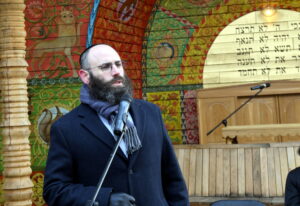The two-day visit of the delegation was organized by the European Jewish Association (EJA) in partnership with the Babyn Yar Holocaust Memorial Center and the Federation of Jewish Communities of Ukraine ahead of International Holocaust Remembrance Day, writes Yossi Lempkowicz.
“We appreciate very much that you choose to come to Ukraine despite the current situation,” said Ukrainian Deputy Prime Minister Olha Stefanishyna as she addressed a delegation of 100 senior ministers, members of parliament, diplomats and Jewish leaders from across Europe who visited Kiev to commemorate Babyn Yar, the most infamous sites of the Holocaust and to pledge to promote education of the Holocaust in schools and to fight antisemitism.
The two-day visit of the delegation was organized by the European Jewish Association (EJA) in partnership with the Babyn Yar Holocaust Memorial Center and the Federation of Jewish Communities of Ukraine ahead of International Holocaust Remembrance Day. The initiative aims to keep antisemitism as a priority political and educational issue and ensure that the Babyn Yar tragedy is never forgotten.
Also known as the “Holocaust by bullets”, Babyn Yar saw around 34,000 Jews murdered and buried in a mass grave by the Nazis and their collaborators in two days in September 1941, and is never forgotten.
Day one saw a symposium to discuss the challenge of combating on-going antisemitism across the continent and the creation of parliamentary working groups to tackle the issue on all its forms.
Among the speakers who addressed the symposium on Monday was the Ukraine Parliament President Ruslan Stefanchuk (pictured, below), who stressed that Ukraine is the fourth country when it comes to the number of Righteous Among the Nations, those who helped Jews during WWII.
“Fighting antisemitism is an endless task which cannot be summed up to polite speeches in one day in the yearly calendar,” declared Rabbi Menachem Margolin, Chairman of the European Jewish Association, during a memorial ceremony at the site of Babyn Yar.
The Ukranian parliament recently adopted al law to fight and prevent antisemitism in the country and to commemorate the Holocaust. “Memory is the only way to fight antisemitism,” he said. “The atrocities all happened because people kept silent because fear, indifference and egoism. The study of the Holocaust is of special importance for the Ukrainians,” he added.
”Fighting antisemitism is an endless task which cannot be summed up to polite speeches in one day in the yearly calendar,’’ declared Rabbi Menachem Margolin, chairman of the European Jewish Association.
“Significant educational work in all formal and informal educational frameworks and in civil society are needed and they all need to be backed by concrete laws and not by mere recommendations,” he said.
Michael Sidko, last survivor of the Babi Yar massacare, who lives in Israel, shared his story with the conference attendees. He was six years old when the atrocity occurred. His mother, younger sister Clara and baby brother were shot dead by the Nazis in cold blood. He and his brother managed to escape thanks to one of the Ukrainian guards who let some children escape to the forests. Sidko asked members of parliament to return to their countries and work to teach the younger generation the story of the Holocaust and its lessons and to educate them to strive for peace and brotherhood among all peoples.
Michael Sidko, last survivor of the Babi Yar massacare
Rabbi Meir Stambler, Chairman of the Federation of Jewish Communities of Ukraine, noted that Jewish communities in the country are being renewed with the full support of the authorities. “There is a lot of dualities in relation to the nation’s heroes who were also antisemitic and we warn about that but understand that this is a nation being rebuilt after 70 years of communism. As someone who walks the streets of Kiev with all the hallmarks of a religious Jew, I must note that in Kiev I feel much safer as a Jew than Paris, Brussels. London or any other European capital,” he said,
The delegation of personalities participated in a memorial ceremony at the site of the Babyn Yar massacre where a memorial museum is being built.
Share this article:





























